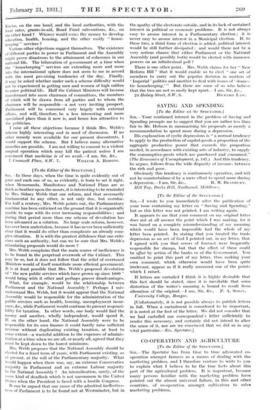[To the Editor of the SPECTATOR.] Stn,—In these days, when
the time is quite evidently out of joint and each one of us, as evidently, is born to set it right, when Memoranda, Manifestoes and National Plans are as thick as heather upon the moors, it is interesting to be reminded by Mrs. Sidney Webb that one reform, and that necessarily fundamental to any other, is not only due, but overdue. 'For half a century, Mrs. Webb points out, the Parliamentary machine has been criticized on the ground that it is organically unable to cope with its ever increasing responsibilities ; and during that period more than one scheme of devolution has been advanced as a solution. No large scale reform, however, has ever been undertaken, because it has never been sufficiently clear that it would do other than complicate an already com- plex situation. It is with the greatest diffidence that one criti- cizes such an authority, but can we be sure that Mrs. Webb's stimulating proposals would do more ?
Mrs. Webb complains that the main source of inefficiency is to be found in the perpetual overwork of the Cabinet. This may be so, but it does not follow that the relief of overtaxed Ministers would of itself constitute more efficient government. It is at least possible that Mrs. Webb's proposed devolution
the new public services which have grown up since 1880 " would bring with it other and perhaps graver disadvantages.
What, for example, would be the relationship between Parliament and the National Assembly ? Perhaps I mis- understand Mrs. Webb, but it would appear that the National Assembly would be responsible for the administration of the public services such as health, housing, unemployment insur- ance, &e., while Parliament would continue its present responsi- bility for taxation. In other words, one bcidy would find the money and another, wholly independent, would spend it. If, on the other hand, the National Assembly were to be responsible for its own finance it could hardly raise sufficient revenue without duplicating existing taxation, at least to sonic extent—a wasteful addition to the expenses of adminis- tration at a time when we are all, or nearly all, agreed that they lutist be kept down to the barest minimum.
Mrs. Webb proposes that the National Assembly should be elected for a fixed term of years, with Parliament existing, as at present, at the will of the Parliamentary majority. What would happen when there was, say, an extreme Conservative majority in Parliament and an extreme Labour majority in the National Assembly ? An intensification, surely, of the same kind of deadlock which is not uncommon in the United States when the President is faced with a hostile Congress.
It can be argued that one cause of the admitted ineffective- ness of Parliament is to be found not at Westminster, but in the apathy of the electorate outside, and in its lack of sustained interest in political or economic problems. It is not always easy to arouse interest in a Parliamentary election ; it is never easy to arouse interest in a Municipal election. If, to these two, a third form of election is added, political interest would be still further dissipated ; and would there not be a very serious chance that either Parliament or the National Assembly (and possibly both) would be elected with immense powers on an infinitesimal poll ?
There is one other point. Mrs. Webb claims for her " New Reform Bill " that it would enable us to elect " one set of members to carry out the popular decision in matters of ' Imperial ' politics and another to deal with issues of domes- tic housekeeping.' " But there are some of us who believe that the two are not so easily kept apart.—I am, Sir, &c.,











































 Previous page
Previous page